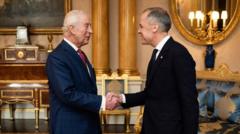In a historic turnaround, Mark Carney’s invitation to King Charles III signals Canada’s deepening ties to the monarchy while reinforcing its independence, especially against American pressures.
King Charles III's Invitation to Canada: A Diplomatic Shift Amidst US Relations

King Charles III's Invitation to Canada: A Diplomatic Shift Amidst US Relations
A profound message emerges as Canada invites King Charles III, highlighting its sovereignty and stance against Trump.
In a bold move that resonates deeply with both Canadians and international observers, Prime Minister Mark Carney has officially invited King Charles III to deliver the Speech from the Throne at the opening of Canada's 45th Parliament. This invitation is emblematic of a significant shift in Canada's relationship with the Crown as the nation navigates complex ties with the United States, notably under President Donald Trump.
This diplomatic gesture starkly contrasts with events from 2011, when former Prime Minister Stephen Harper stirred controversy after swapping out Canadian art for a portrait of Queen Elizabeth II, perceived by many as a regressive nod to colonial ties that did not sit well with a modern, increasingly independent Canada. Upon Trudeau's ascension in 2015, symbols of royalty were downplayed, reflecting a desire to distance Canada from its colonial past.
Fast forward to 2025, Carney’s administration is embracing royal connections, signaling a united front against perceived threats from Trump, who has often undermined Canada’s sovereignty, referring to it dismissively as a potential "51st state." By inviting King Charles, Carney intends to underscore Canada’s unique identity, emphasizing its separation from the US and reasserting its status within the Commonwealth.
Experts see the invitation as a pivotal strategic maneuver, with royal historian Justin Vovk stating, "This is not just about symbolism; it reflects a desire to stand apart from American influence." As Canada evolves, retaining a constitutional monarchy, the balance between acknowledging royal heritage and asserting autonomy remains delicate and fluid.
Historically, Canada's relationship with the monarchy has fluctuated through political eras. The move resonates particularly with the backdrop of Trump's previously antagonistic tariffs and comments that threatened Canada's economic stability, further enunciating the need for a cohesive national identity.
Carney characterized this historic visit as a "historic honour that matches the weight of our times," describing the moment as pivotal for affirming national sovereignty. Despite ambivalence among many Canadians regarding the monarchy, the royal visit's political implications could initiate significant dialogues regarding Canada's direction both domestically and internationally.
Moreover, the King’s visit carries personal significance, being his first as a reigning monarch and his initial opportunity to engage with Canadian leadership since previously cancelled plans due to health issues in 2022. During their brief itinerary, the royal couple seeks to leave an "impactful" legacy, initiating conversations on reconciliation and contemporary relations with Indigenous communities amidst growing scrutiny over historical grievances tied to colonial connections.
While some provinces, notably Quebec, continue to voice calls for severing ties with the monarchy, the general populace’s indifference towards royal presence is evident. However, Carney's move indicates an intention not only to stabilize relationships with the US but to actively pursue deeper connections with European allies—a vision reflective of the Prime Minister’s tenure as a former governor of the Bank of England.
Overall, as Canada positions itself within a global context fraught with challenges, the invitation to King Charles III serves as a delicate balance of reaffirming traditional ties while asserting its sovereignty, addressing domestic and foreign concerns that shape the nation’s evolving identity.




















